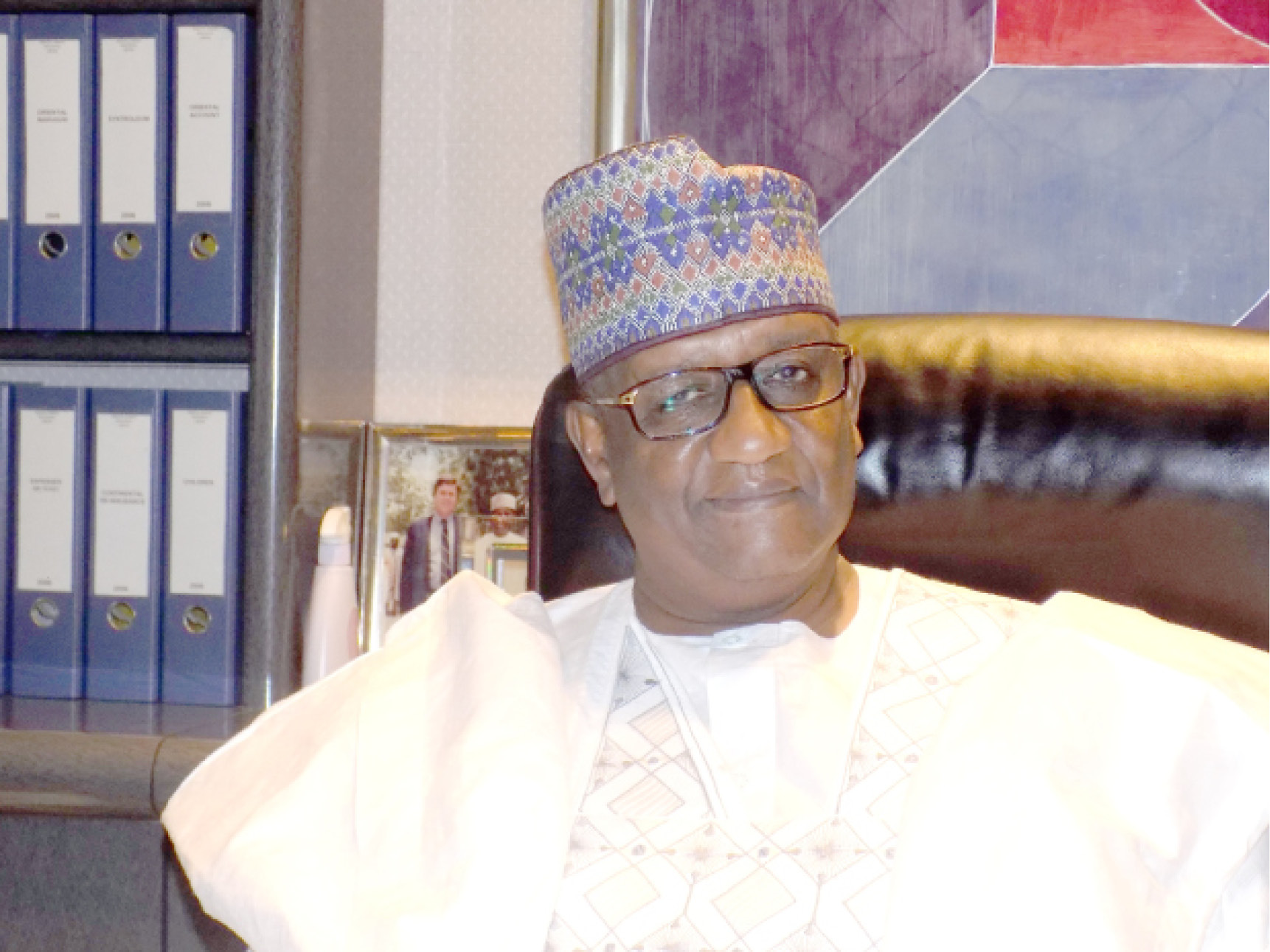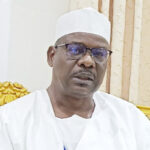Alhaji (Dr) Muhammad Indimi, who turned 72 on August 12, 2019, is the chairman, Oriental Energy Resources Limited (OERL). Among other things, in this interview, the renowned businessman revealed how he rose from a humble beginning, and without formal education, to become successful in life.
How would you describe your childhood?
I was born in Maiduguri on August 12, 1947; that is why August is my best month of the year. I was born into a humble, low key family. At that time, all my friends were attending formal school but my parents did not have the money, so they couldn’t afford to send me to school. This means that nobody taught me ABCD or how to write my name. I struggled a lot, but now, I can read and speak. In my organisations I have engineers with PhDs, professors, etc, and I communicate with them very well.
I started struggling at the age of 10 because my father was already old and couldn’t do anything. That is why anytime I am driving if I see children on the road I always remember that I was like them.
In my family I was the youngest. My two brothers tried but could not make it, so I took over the affairs of the family. I went everywhere to look for how to make money. My father instilled discipline in me, which saw me grow into a responsible man, in the sense that I could take a penny and turn it into a shilling. At the age of 10 we used to go to all the local markets around Borno Province, like Gamborun Ngala. My father was into hides and skin business, so we would go to various markets. He would sit in one place while I ran around to buy goods for him. And whenever we were going to the markets I would get items like mosquito nets, textile materials etc and take to other markets. Some of them were 89 kilometers. It took us one month during the rainy season because the roads were small and there were barriers. Sometimes it rained 10 days nonstop, and you would be kept there. The food we used to carry with us would spoil.
In the villages around, they were experts in cooking and selling rats and frogs, so that’s what we ate. We drank rain water. I couldn’t afford slippers; and if I wanted some, I would go to the market where you would put your feet on a tyre rubber and they would measure you and cut your size for six pence. This is a little bit of my background. I always share such memories with my children. I never had a room of my own until the age of 19; I was always sleeping in the streets.
We used to have small rooms hired by the Igbo, but when the 1966 pogrom started, they left and I bulldozed into one of such rooms, and my father didn’t do anything because I used to help the family.
I will attribute my success today to destiny, I am always honest, humble, and I am not afraid to tell anybody the truth.
Going by your story, you had a very challenging childhood, at what point did you get some relief?
At the age of 16 I got my independence from my father. He took a loan of 100pounds from his friend, the late Alhaji Umaru Tela, and gave to me, knowing that I would not disappoint him. So I would go to markets every week, buying and selling, and the money still remained because 100pounds was big money. My father had four wives and gave each of them 30shillings every month for groceries, etc. I had to be doing that until he passed away. At that time, the civil war was still on.
There were no foreign products in this part of Nigeria. And there were young people who were looking for shirts, jeans, etc but they could not find, so I crossed the border to Chad and Cameron to get such things. I would come back and sell here and I became successful. In fact, since then I have always been going forward, never backwards. It is destiny which no one can take away from me. I can never deceive or tell you lies because I want to get something from you.
Do you have childhood friends?
I have friends, but most of them didn’t make it successfully in life. I told you about destiny. Some of them are no more. Sometimes I send my drivers to bring those that are still alive, such as Farouk Jibrin, who is in Abuja. Some are in Maiduguri. When they come we will eat and joke. They even beat me and I enjoy it. I see how God has upgraded me. Sometimes I cry and support them.
I struggled a lot. In some of the places I travelled to they spoke different languages and I had to learn. In Chad, it was Arabic, so I had to learn through listening. In northern Cameroun, it was Fulfulde, so I had to push myself to speak same. Of course, English is Nigeria’s official language, so I learnt that too. Also, Hausa is my father’s language while Kanuri is my mother’s. She didn’t speak Hausa but she understood it. So I speak five languages.
Did you travel outside the shores of Nigeria?
During the war I was travelling all over the North-East and other places, but I later started going to the Middle East, Beirut, Saudi Arabia; and I kept growing.
How would you compare life nowadays with what you experienced in those days?
When we were young, there were no bicycles, so we used to walk. In Maiduguri there were mud houses and few red bricks. You had to be somebody to even own a mud house. Majority of the houses were ordinary huts, but slowly, Maiduguri started to expand. We were in Hausari quarters. My father, with his Hausa background, was a respected elder in Maiduguri. He was very close to the Shehu of Borno, who told him to go and establish a Hausa community; hitherto they were in Kukah. That was 1901.
You also went to the USA, how did you do it?
It was destiny. I was just sitting and a friend of mine, Bunu Sherrif Musa, an engineer who was the project manager of the Lake Chad Basin Authority came with the address and phone number of a company in the US and said, “I know you can do it for us. Can you get us pumps to fill all these canals? Obasanjo is coming in three months to commission it.’’ There was a project the then head of state was supposed to come and commission. It was an irrigation project. They had everything but the lake had started moving back and the water pump was hanging.
With confidence I said, “Okay, I will try.’’ It’s a six-hour difference between the US and Nigeria. I called a number and they picked and said, “M. I. W Pumps.’’ I told them that I wanted to buy pumps and the lady said I should hold on. She linked me to the Senior VP International known as Honse, who told me that if I was serious I had to come. And I said fine.
I had never been to the US before then. In the morning there was a Nigerian Airways flight F 27, via Jos, Kaduna to Lagos. I took that flight at 8am and by 11am we were in Kaduna. I took a taxi to American Consulate, and through the window I requested for a visa. Without any question, the white man there gave me a form to fill. I filled the form and he gave me a four-year multiple visa.
I then took a taxi back to the airport and got a flight to Lagos in the same day. At the Lagos airport, I went to the international section and asked for a US flight. They said there was a Pan American flight at 11pm, with a stopover in Monrovia, Liberia. We were to arrive at 6am. I said I wanted to go to Miami. They did all the connections, and before noon the next day I was in Miami.
I didn’t know what to do. There was a coin box, so I asked someone to help me with a number since I didn’t have coins. He agreed and called the same number I mentioned earlier. I spoke to the same person who said he already told me to come. I said I was already in Miami and he said okay and directed me somewhere, saying he would be with me in one hour. He eventually came and took me to a hotel, where I ate. I was just 32 years old.
I went to their office and I filled several forms and he gave me an invoice of $1.3 million. They gave me a pro forma invoice and I came back to Nigeria and opened a letter of credit.
So everything went smoothly. They said they could fill the canal within three months. We had to charter a Jumbo jet from Miami to Maiduguri. The airport officials in Kano said we didn’t have facilities in Maiduguri, so we offloaded them in Kano and used trucks to bring them to the project site in Maiduguri.
It was very successful and the River Basin people invited everyone to come and see the miracle. That was how I went to America.
Where do you normally stay in the US?
I used to stay in Miami, but since I joined the oil business, I have moved to world oil capital, Houston. I have an office there and a home. Mustafa takes care of the office there. My technical office in Nigeria is in Lagos while my headquarters is in Abuja.
You are renowned for philanthropy, how many people’s lives did you affect specially?
In discharging its corporate social responsibility to the host communities where it operates, my company, Oriental Energy Resources Limited (OERL) built 100 units of N700million modern residential estate in Enwang, awarded over 470 scholarships in Akwa Ibom State and established a sponsored programme in the Department of Petroleum and Chemical Engineering, University of Uyo. Apart from humanitarian gestures, we also donated an international business centre to Lynn University in the USA.
Our charitable activities cut across health, education, housing and social welfare, among others. We established the Muhammad Indimi Foundation (MIF), with the sole aim of lifting thousands out of hunger, disease, illiteracy and poverty in northern Nigeria. In 2016, the MIF sponsored hundreds of students, mostly from Borno and Yobe, to study at the International African University in Sudan, and have supported people affected by the Boko Haram insurgency in the North-East. The Foundation has also provided food, clothing, schools and clinics for internally displaced persons in Borno State.

How big has your company grown?
It is God, my destiny. I didn’t attend formal school, but now, every year I give at least 100 scholarships up to university level. I don’t get annoyed, instead I give thanks always. Even if you have money, the one you use is the one that is yours; the one you don’t use is not yours. If you go to my closet you would see thousands of clothes, but I am only wearing one at the moment. Just like money in the bank, the one you use is yours, the rest is not. It is that simple.
At what age did you get married?
I was 23 years when I got married. Normally, parents get their children married, but in my own case, my father had died, so I had to struggle to do it. I looked for a girl, my friend’s sister, but it was a big challenge because her family said I didn’t have anything; but her mother asked her husband, “When you married me, what did you have?’’ That was in 1970 when I first wedded.
Before we got married, my other rival was not very young, but I used to go to their house to play with her brothers, so she said no to the other guy. But unfortunately, two years after, when she was having a baby she died. I married again in June 1975. By August we went to India for our honeymoon; and we even flew first class.
People say you hardly talk, is it true?
What do they want me to say? I have to shy away because when you speak you are misconstrued by people who would say we heard it from others. And I don’t do the culture of gossiping. If you come to me and start talking about people I will shut you out.
There’s either hell or heaven, and those talking about people are courting hell, not me. Here, I pray when it is time, I talk with my children, and I know they cannot bring any gossip talk. We play and travel together. Soon they will take over from me. Mustafa, who is a petroleum engineer, heads the engineering arm of my organisation. I have 20 children – 12 girls and eight boys. Some are working with me, others are not.
Don’t you think people would interpret your action as arrogance?
Arrogance is another key to hell. Why don’t you lead your own life? God does not like the arrogant. I am not arrogant at all; I am very simple and humble.
How do you keep fit?
My second religion is exercise. We are about to re-commission our gym in Maiduguri. I play golf, which is my best game. I take one month off, just to go and play golf overseas. I enjoy exercise. After morning prayers every day, I do some pushups. We are changing all the gadgets for exercise in our gym.
What is your favourite food?
I enjoy local foods like burabisko, tuwo da miyan kuka. I don’t like rice. When I was young, I couldn’t afford to eat rice or chicken. I can live with only local foods.
What do you eat when you travel abroad?
I travel with my cook, as well as my groceries.
How do you run your oil business in Nigeria?
I just came back from Lagos, where I had a meeting with my oil partners. We are small but big. We comply, we don’t cut corners. If I can cut corners I can make plenty of money, but I won’t do that.
I told my partners that I am not into this business to make profit per se; my aim is to make all these people happy. That is key. We pay our tax, and I thank God. I have competent members of staff who also trust me.
If you are working for somebody, don’t allow doubt to come in because once you start doubting someone, forget it. But nobody is above mistake because we are human beings. Whatever is happening in my organisation I see it. I don’t have to be there; I see everything.
Nigeria is importing oil and subsidizing it for citizens, is this right?
No, it is ridiculous. Why should Nigeria import oil? It is the leadership. Look at Dangote; he is not government, but next year he is going to commission his refinery. That’s one person, then why is it that government can’t do it?
Where is the subsidy? I don’t believe in subsidy; they are killing the country. That’s why we are backward. If we can get power right we’ll be among the top 10 in the world because you don’t need to call for investors. Investors are like vultures, they feast on carrion. Investors want electricity, good roads, and we don’t have all these. There’s no local government out of 774 with steady power supply. It is a pity that in Nigeria, even water is a luxury.
What is the way forward?
I am sorry, but I just pity the next generation. Hopefully, they can do it. We should thank God who brought President Muhammadu Buhari to help the country. He is God sent, but some people are fighting God instead of praying for him and supporting him.
Buhari is not the type that can deceive you or steal, or tell you lies. I used to wonder why Buhari became a politician. I have never been interested in politics because I cannot tell you lies.
Have you ever been approached by any political party?
They tried long ago, but I cannot join any of them because politicians will only tell you what you want to hear, just to get your votes.
What is that thing that gives you joy?
Helping people gives me happiness.

 Join Daily Trust WhatsApp Community For Quick Access To News and Happenings Around You.
Join Daily Trust WhatsApp Community For Quick Access To News and Happenings Around You.


